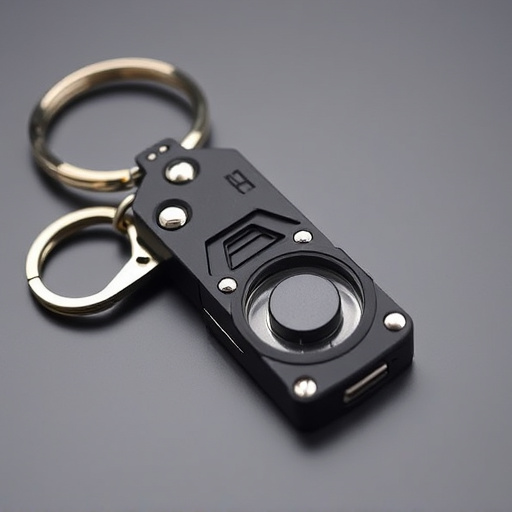Tactical keychains, compact personal defense tools with blades, impact weapons, or pepper spray, offer discreet self-defense but vary greatly in legality across US states. Users must understand local regulations to avoid legal issues while exercising public self-defense rights. Balancing tactical capabilities and legal compliance ensures effective use of keychains for outdoor enthusiasts, first responders, and safety-conscious individuals. Choosing a tactical keychain aligned with specific needs, featuring reliable functionality, and adhering to state laws is crucial for effective self-defense in diverse situations.
In today’s world, personal safety is paramount. One innovative solution gaining traction are tactical keychain devices, compact weapons designed for self-defense. This article delves into the legal landscape surrounding these protective keyring tools, exploring which US states permit their carry. We’ll dissect the benefits and considerations of tactical keychains, guide you through choosing the right device for your needs, and highlight key techniques to maximize their effectiveness.
- Understanding Tactical Keychain Devices: A Legal Overview
- States Allowing Legal Carry of Protective Keyring Weapons
- Benefits and Considerations for Tactical Keychains
- Choosing the Right Tactical Keychain for Your Needs
Understanding Tactical Keychain Devices: A Legal Overview
Tactical keychains, or defensive tools designed for personal protection, have gained popularity as a discreet and readily available self-defense option. These devices often incorporate various tactical techniques, such as sharp blades, impact weapons, or even pepper spray dispensers, all compactly integrated into a keychain form factor. The legal landscape surrounding these tools varies significantly across different states, making it crucial for users to understand the regulations in their area.
In many jurisdictions, tactical keychains are regulated under specific self-defense or concealed weapon laws. Some states allow their open carry, while others restrict them to situations where they can be justified as a necessary defense against imminent harm. The definition of what constitutes a “tactical keychain” and the conditions under which they can be legally carried also differ widely. Understanding these legal nuances is essential for ensuring compliance and avoiding any potential consequences when exercising one’s right to self-defense in public spaces.
States Allowing Legal Carry of Protective Keyring Weapons
In the United States, the legal carry of protective keyring weapons varies significantly from state to state, with each having its own set of regulations and restrictions. For those seeking tactical keychain weapon techniques for personal safety, understanding these laws is crucial. Several states allow the open or concealed carry of certain types of defensive tools, including keyring-mounted self-defense devices.
Among the states that permit this, Texas stands out with its liberal gun laws, allowing residents to carry protective keychains almost anywhere, without a permit. Similarly, Florida and Arizona also have permissive policies regarding tactical keychains. Other states like Georgia, Oregon, and Colorado have specific provisions for concealed carry permits, which may include certain types of self-defense keychains. It’s important to note that even within these states, there are restrictions on the type, size, and capability of the weapon, with many requiring it to be non-lethal or limited to certain force levels.
Benefits and Considerations for Tactical Keychains
Tactical keychains offer a range of benefits for individuals seeking enhanced security and self-defense capabilities while on the go. These compact devices often incorporate various tools such as flashlights, knife blades, or pepper spray, allowing users to be prepared for unexpected situations. The versatility of tactical keychains is particularly appealing to outdoor enthusiasts, first responders, and those who prioritize personal safety. By integrating these tools into a convenient keyring, individuals can easily access essential self-defense mechanisms without sacrificing mobility.
When considering tactical keychains, several factors should be taken into account. While their compact design provides convenience, it’s crucial to ensure that the functionality of each tool is reliable and easy to operate in high-stress situations. Additionally, legal considerations play a significant role, as certain states have restrictions on carrying specific tools like knives or pepper spray. Users must familiarize themselves with local laws to avoid any legal complications. Understanding the right balance between tactical features and compliance with regulations ensures that individuals can effectively utilize their keychains for self-defense while adhering to legal boundaries.
Choosing the Right Tactical Keychain for Your Needs
When selecting a tactical keychain, aligning it with your specific needs is paramount. Consider the tasks you require it for—is it for self-defense, outdoor adventures, or everyday carry? A tactical keychain designed for self-defense will often include features like a built-in flashlight, a sharp blade, and tools for breaking glass, making it ideal for emergencies. For outdoor enthusiasts, look for keychains with tools tailored to survival scenarios, such as a can opener, whistle, and multi-hook.
In terms of tactical keychain weapon techniques, the right choice will offer versatility. Some models allow you to attach your keys securely while others include a lanyard for easy access and reduced risk of loss. Advanced features like a quick-release mechanism or adjustable lengths ensure comfort and convenience during various activities. Incorporating these considerations into your decision will guarantee that your tactical keychain becomes a reliable companion, enhancing safety and practicality in diverse situations.
In conclusion, tactical keyring devices offer a practical and discreet self-defense solution for those seeking protective gear. With various legal carry options available in specific states, individuals can empower themselves while navigating the intricacies of different regulations. Understanding the benefits and considerations associated with tactical keychains enables users to make informed decisions when choosing the right device for their needs. By staying informed about legalities and selecting appropriate techniques, one can effectively utilize these compact tools, enhancing personal safety without compromising convenience.
